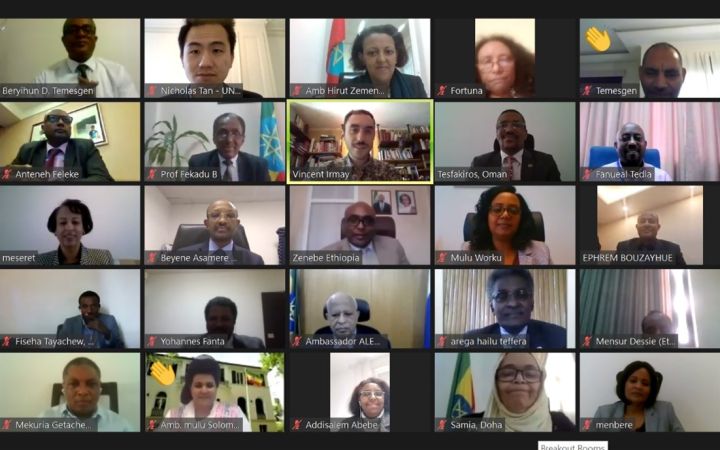11-14 January 2021, Addis Ababa, Ethiopia – A group of 97 senior officials and ambassadors from the Ministry of Foreign Affairs and the Ministry of Environment, Forest, and Climate Change engaged in a four-day UNITAR High-Level e-Workshop to improve their skills and knowledge in environmental diplomacy, in the lead-up to this year’s Conference of Parties (COP26). The activity was made possible with the financial support of SIDA, Sweden’s government agency for development cooperation.
With the UN Secretary-General having declared that the focus of the UN’s agenda for 2021 will be addressing the climate emergency, UNITAR assembled three renowned experts on climate change to prepare the officials to meet this challenge. The experts drew from their combined expertise in UNFCCC negotiations, climate science, and regional knowledge in East Africa to provide the officials with a comprehensive grounding in the main issues surrounding climate change.
On the first two days of the workshop, participants immersed themselves in the history and causes of climate change, while brushing up on the contemporary debates surrounding climate finance, mitigation methods, and the reports of the Intergovernmental Panel on Climate Change (IPCC). The lectures were elevated by the participants’ discussion about the role Ethiopia plays in addressing these challenges, and led to a constructive dialogue between them and the trainer.
On the subsequent two days, the trainers turned their focus to how climate change is affecting East Africa, and provided our participants with an opportunity to put theory to practice – in this case, using their knowledge of the key issues in COP25 and the upcoming COP26 in simulation exercises. The participants took on different roles in the main negotiating blocs, setting out their positions and aiming to achieve consensus between different viewpoints. This dynamic exercise allowed them to understand how different parties approach climate conferences, and their enthusiasm made the experience both realistic and fulfilling.
The diplomats left the workshop with increased awareness on climate change diplomacy, writing to UNITAR that the information provided was not only relevant to the upcoming negotiations, but to their daily work as diplomats and civil servants – many are involved in addressing the humanitarian consequences of climate change on its frontlines in East Africa.
Inspired by this workshop’s success, UNITAR looks forward to organising similar activities with other interested parties, and improving their skills to meet one of the defining challenges of the 21st century.



